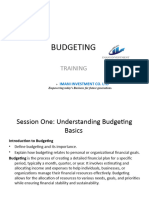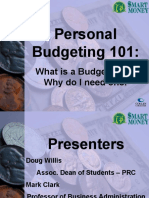0% found this document useful (0 votes)
16 views1 pageBudgeting Guide
A budget is a financial plan that outlines income and expenses, aiding in resource allocation and financial goal achievement. Budgeting is important for financial control, goal setting, debt management, and emergency preparedness. To create a personal budget, track income, list expenses, set goals, create a plan, and regularly monitor and adjust as needed.
Uploaded by
panghaldharmender4591Copyright
© © All Rights Reserved
We take content rights seriously. If you suspect this is your content, claim it here.
Available Formats
Download as PDF, TXT or read online on Scribd
0% found this document useful (0 votes)
16 views1 pageBudgeting Guide
A budget is a financial plan that outlines income and expenses, aiding in resource allocation and financial goal achievement. Budgeting is important for financial control, goal setting, debt management, and emergency preparedness. To create a personal budget, track income, list expenses, set goals, create a plan, and regularly monitor and adjust as needed.
Uploaded by
panghaldharmender4591Copyright
© © All Rights Reserved
We take content rights seriously. If you suspect this is your content, claim it here.
Available Formats
Download as PDF, TXT or read online on Scribd
/ 1























































































